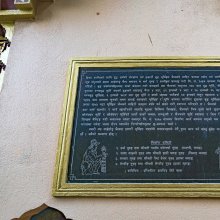Khand, Khaṇḍ: 7 definitions
Introduction:
Khand means something in Hinduism, Sanskrit, Hindi, biology. If you want to know the exact meaning, history, etymology or English translation of this term then check out the descriptions on this page. Add your comment or reference to a book if you want to contribute to this summary article.
Images (photo gallery)
Biology (plants and animals)
Source: Google Books: CRC World Dictionary (Regional names)Khand in India is the name of a plant defined with Saccharum officinarum in various botanical sources. This page contains potential references in Ayurveda, modern medicine, and other folk traditions or local practices It has the synonym Saccharum officinarum var. otaheitense Roem. & Schult. (among others).
Example references for further research on medicinal uses or toxicity (see latin names for full list):
· Plantae Javanicae Rariores (1848)
· Enumeratio Plantarum Omnium Hucusque Cognitarum (1833)
· Taxon (1989)
· Grasses of Ceylon (1956)
· Revised Handbook to the Flora of Ceylon (1900)
· Flora Indica, or ‘Descriptions of Indian Plants’, ed. 1820 (1820)
If you are looking for specific details regarding Khand, for example diet and recipes, pregnancy safety, health benefits, chemical composition, extract dosage, side effects, have a look at these references.

This sections includes definitions from the five kingdoms of living things: Animals, Plants, Fungi, Protists and Monera. It will include both the official binomial nomenclature (scientific names usually in Latin) as well as regional spellings and variants.
Languages of India and abroad
Sanskrit dictionary
Source: DDSA: The practical Sanskrit-English dictionaryKhaṇḍ (खण्ड्).—1 P. (khaṇḍayati, khaṇḍita)
1) To break, cut, tear, break to pieces, crush; Bhaṭṭikāvya 15.54; सौहार्दं शकटेन खण्डितम् (sauhārdaṃ śakaṭena khaṇḍitam) Mu.5.18; Śiśupālavadha 7.31,2.24,6.16,12.3.
2) To defeat completely, destroy, dispel; रजनीचरनाथेन खण्डिते तिमिरे निशि (rajanīcaranāthena khaṇḍite timire niśi) H.2.III.
3) To disappoint; frustrate, cross in love; स्त्रीभिः कस्य न खण्डितं भुवि मनः (strībhiḥ kasya na khaṇḍitaṃ bhuvi manaḥ) Pañcatantra (Bombay) 1.146.
4) To disturb.
5) To cheat.
Source: Cologne Digital Sanskrit Dictionaries: Benfey Sanskrit-English DictionaryKhaṇḍ (खण्ड्).—I. † i. 1, [Ātmanepada.] Ii. i. 10, [Parasmaipada.] (rather a [denominative.] derived from the next), 1. To cut to pieces, [Pañcatantra] 47, 5. 2. To break, [Vikramorvaśī, (ed. Bollensen.)] [distich] 19. 3. To bite, [Pañcatantra] 46, 1. 4. To destroy, [Hitopadeśa] ii. [distich] 107. 5. To cause to cease, to satisfy, [Rājataraṅgiṇī] 5, 281. 6. To trouble, [Rāmāyaṇa] 3, 14, 14. khaṇḍita, Afflicted, [Meghadūta, (ed. Gildemeister.)] 40.
— With the prep. vi vi, 1. To dismember, [Pañcatantra] iv. [distich] 60. 2. To trouble, [Bhāgavata-Purāṇa, (ed. Burnouf.)] 4, 25, 30.
Source: Cologne Digital Sanskrit Dictionaries: Monier-Williams Sanskrit-English DictionaryKhaṇḍ (खण्ड्):—[class] 1. [Ātmanepada] ṇḍate, to break, divide, destroy, [Dhātupāṭha viii, 31] : [class] 10. [Parasmaipada] khaṇḍayati, to break, tear, break into pieces, crush, cut, divide, [Pañcatantra; Bhaṭṭi-kāvya] ([Aorist] acakhaṇḍat) ;
—to destroy, remove, annihilate, [Rājataraṅgiṇī v, 281; Naiṣadha-carita v, 4];
—to defeat, conquer, [Bhaṭṭi-kāvya xii, 17];
—to refute;
—to interrupt, disturb, [Rāmāyaṇa iii, 14, 14; Kathāsaritsāgara];
—to disregard (an order), [Rājataraṅgiṇī vi, 229; Kathāsaritsāgara cxxiv, 79];—‘to disappoint, deceive, cheat’ See khaṇḍita.
[Sanskrit to German]
Sanskrit, also spelled संस्कृतम् (saṃskṛtam), is an ancient language of India commonly seen as the grandmother of the Indo-European language family (even English!). Closely allied with Prakrit and Pali, Sanskrit is more exhaustive in both grammar and terms and has the most extensive collection of literature in the world, greatly surpassing its sister-languages Greek and Latin.
Hindi dictionary
Source: DDSA: A practical Hindi-English dictionary1) Khand in Hindi refers in English to:—(nm) a portion, part, fragment, piece, bit; scrap; lump; chunk; section; clause; block; segment; canto; volume; factor; region; division; —[katha] a small narrative/tale; ~[kavya] a long episodic poem (not fulfilling the requirements of an epic), a near-epic poem, epicoid;—[khamda] broken/turned into pieces; fragmented; —[pralaya] partial deluge; —[vakya] a clause..—khand (खंड) is alternatively transliterated as Khaṃḍa.
2) Khand in Hindi refers in English to:—(nf) unrefined sugar..—khand (खांड) is alternatively transliterated as Khāṃḍa.
...
See also (Relevant definitions)
Starts with (+385): Khamdabhamda, Khamdabhraka, Khamdacamdra, Khamdagattu, Khamdahamda, Khamdakathe, Khamdakhamdi, Khamdaladduge, Khamdamanikamcana, Khamdamegha, Khamdamgoy, Khamdamtara, Khamdamtaracalane, Khamdane, Khamdanegey, Khamdanehana, Khamdanihana, Khamdaniyate, Khamdanyayalaya, Khamdapatta.
Ends with: Akhand, Avakhand, Bilai-khand, Pakhand, Sakkhar-khand, Shreekhand, Shrikhand, Ukhand, Upkhand, Vekhand, Vidarikhand.
Full-text (+88): Khandana, Akhandala, Khandaka, Khandava, Bilai-khand, Pakkhandati, Khandeti, Khandiya, Khandanakrit, Khanderaya, Khandiman, Khanda, Vanasanda, Khandasamsthapaka, Khandata, Khandapaka, Khandaphana, Khandakushmandaka, Khandavikriti, Khanditashamsa.
Relevant text
Search found 9 books and stories containing Khand, Khaṇḍ; (plurals include: Khands, Khaṇḍs). You can also click to the full overview containing English textual excerpts. Below are direct links for the most relevant articles:
Chandogya Upanishad (Madhva commentary) (by Srisa Chandra Vasu)
Rivers in Ancient India (study) (by Archana Sarma)
6. The river Narmadā in the Purāṇas < [Chapter 5 - Rivers in the Purāṇic Literature]
The Vishnu Purana (by Horace Hayman Wilson)
National Integration < [July – September, 1986]
New Ways in Marathi Literature < [March-April 1931]
Aspects of Hindi Literature < [October 1956]
Lakulisha-Pashupata (Philosophy and Practice) (by Geetika Kaw Kher)
Skanda Purana: Providing the building blocks for Saiva mythology < [Chapter 5 - The Mythological Bridge]
Evidence of Ajivika cult in Kashmir < [Chapter 2 - Spread and Transition]
Annadatri-carita (study) (by Sarannya V.)
2. Importance of Annadana in Sanskrit literature < [Chapter 1 - The Myth of Grand Feast]
Related products


